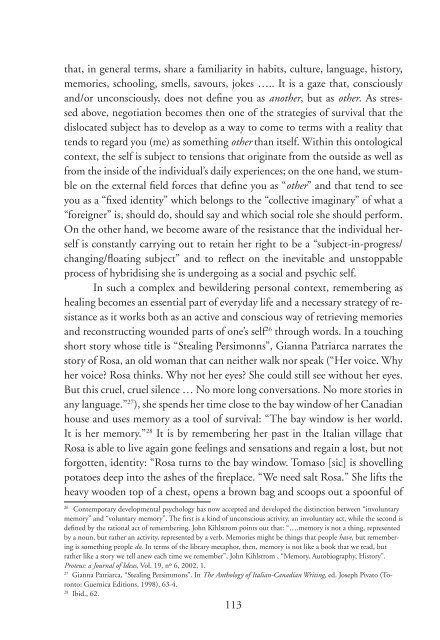Teaching Subjectivity. Travelling Selves for Feminist ... - MailChimp
Teaching Subjectivity. Travelling Selves for Feminist ... - MailChimp
Teaching Subjectivity. Travelling Selves for Feminist ... - MailChimp
You also want an ePaper? Increase the reach of your titles
YUMPU automatically turns print PDFs into web optimized ePapers that Google loves.
that, in general terms, share a familiarity in habits, culture, language, history,<br />
memories, schooling, smells, savours, jokes ….. It is a gaze that, consciously<br />
and/or unconsciously, does not define you as another, but as other. As stressed<br />
above, negotiation becomes then one of the strategies of survival that the<br />
dislocated subject has to develop as a way to come to terms with a reality that<br />
tends to regard you (me) as something other than itself. Within this ontological<br />
context, the self is subject to tensions that originate from the outside as well as<br />
from the inside of the individual’s daily experiences; on the one hand, we stumble<br />
on the external field <strong>for</strong>ces that define you as “other” and that tend to see<br />
you as a “fixed identity” which belongs to the “collective imaginary” of what a<br />
“<strong>for</strong>eigner” is, should do, should say and which social role she should per<strong>for</strong>m.<br />
On the other hand, we become aware of the resistance that the individual herself<br />
is constantly carrying out to retain her right to be a “subject-in-progress/<br />
changing/floating subject” and to reflect on the inevitable and unstoppable<br />
process of hybridising she is undergoing as a social and psychic self.<br />
In such a complex and bewildering personal context, remembering as<br />
healing becomes an essential part of everyday life and a necessary strategy of resistance<br />
as it works both as an active and conscious way of retrieving memories<br />
and reconstructing wounded parts of one’s self 26 through words. In a touching<br />
short story whose title is “Stealing Persimonns”, Gianna Patriarca narrates the<br />
story of Rosa, an old woman that can neither walk nor speak (“Her voice. Why<br />
her voice? Rosa thinks. Why not her eyes? She could still see without her eyes.<br />
But this cruel, cruel silence … No more long conversations. No more stories in<br />
any language.” 27 ), she spends her time close to the bay window of her Canadian<br />
house and uses memory as a tool of survival: “The bay window is her world.<br />
It is her memory.” 28 It is by remembering her past in the Italian village that<br />
Rosa is able to live again gone feelings and sensations and regain a lost, but not<br />
<strong>for</strong>gotten, identity: “Rosa turns to the bay window. Tomaso [sic] is shovelling<br />
potatoes deep into the ashes of the fireplace. “We need salt Rosa.” She lifts the<br />
heavy wooden top of a chest, opens a brown bag and scoops out a spoonful of<br />
26<br />
Contemporary developmental psychology has now accepted and developed the distinction between “involuntary<br />
memory” and “voluntary memory”. The first is a kind of unconscious activity, an involuntary act, while the second is<br />
defined by the rational act of remembering. John Kihlstrom points out that: “….memory is not a thing, represented<br />
by a noun, but rather an activity, represented by a verb. Memories might be things that people have, but remembering<br />
is something people do. In terms of the library metaphor, then, memory is not like a book that we read, but<br />
rather like a story we tell anew each time we remember”, John Kihlstrom , “Memory, Autobiography, History”.<br />
Proteus: a Journal of Ideas, Vol. 19, nº 6, 2002, 1.<br />
27<br />
Gianna Patriarca, “Stealing Persimmons”. In The Anthology of Italian-Canadian Writing, ed. Joseph Pivato (Toronto:<br />
Guernica Editions, 1998), 63-4.<br />
28<br />
Ibid., 62.<br />
113

















